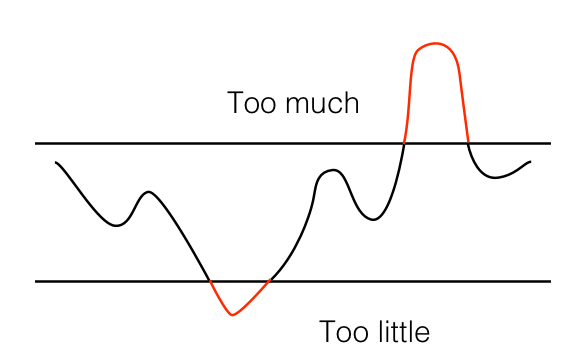Keep the ball in play
In most games, you need to keep the ball in play. When you go out of bounds, the game stops. In real life, that means that to keep the activity going, one needs to stay between boundaries. When you go beyond those boundaries, bad things happen.
Homeostasis and health
From a graphic perspective, you can imagine two parallel lines. Between the lines, everything is fine. Not always perfect and wonderful—there are some ups and down—but OK. Think about sugar levels in the blood: too much or too little and people do not feel good. This is a law of nature. Any system needs to function between healthy boundaries. If you go beyond, the system will eventually break down, either due to excessive activity or the lack of it.
Homeostasis and complexity
We will get back to this, but homeostasis is not written is stone. Its boundaries can move, it evolves over time and one “tube” cannot be envisioned on its own. Soon it has to be taken into consideration in relation to its neighboring and encompassing tubes.
From a linear, causal (or “isolationist” perspective), one needs to focus on maintaining the system within its healthy boundaries. But from a systemic perspective—the bigger picture—it is not so. Complexity needs . That is the fun part of staying healthy, there are multiple parameters to take into account, and to be fixated on just one is not a good idea.
Playing for keeps
Take for instance any situation where someone or some organization is only interested in its own interest. May be it will ensure the continuation of its system, but at what external cost? There are so many examples, from negotiation to global environment, you will not have any problems finding one in your own surroundings. Now the question is, what is you stance, what happens if you narrow the perspective. For most people, it is not difficult to do, that is what they were trained for. Then broaden the perspective. What could happen, what could change, where are the leverage points? Even further: does any win-win solution start to emerge?


